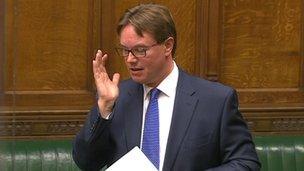Calling time on Friday filibusters?
- Published
Bolstered by two extra-strength lattes, I'm watching the Commons debate Jonathan Lord MP's private member's bill on citizenship rights for foreign and Commonwealth members of the armed forces.

Jonathan Lord during his speech in the Commons
It's a worthy measure aimed at removing an anomaly in the law on the qualifying period before service personnel from abroad can become naturalised UK citizens. But the debate epitomises the kind of mannered tactical game-playing that has become all too typical on these occasions.
It is completely clear that the debate is being padded out to minimise the time available for the next bill on the list to be debated.
It's not so much because there are great objections to the Lib Dem Sir Robert Smith's innocuous proposal on hidden delivery charges, but because the focus is on the downstream possibility of other private members bills competing for time with James Wharton's EU referendum bill (see my earlier post on the tactical games around the Wharton Bill).
So, for example, Mr Lord spoke for an hour, when he could easily have made the case for his bill in 15 minutes. He didn't really need to recall the Roman Emperor Claudius giving citizenship rights to auxiliaries, two thousand years ago, let alone to speculate that the marriage rights he also granted were for "traditional marriage."
Now the Conservative Harriet Baldwin has launched a digression into her grandmother's mastery of Gaelic, having already been urged to stick to the point twice, by the Speaker.
Timetables and votes
I mention this because (a) making network radio out of this kind of debate for BBC Radio 4's Today in Parliament is, err, challenging and (b) because the Commons Procedure Committee has produced some interesting proposals for reshaping the private members' bills.
Their key proposal is to timetable the debates, in the way that most other Commons debates are timetabled. That is to say, most debates have a set end point, at which the house votes. And that implies a time limit on speeches.
The idea is that if someone doesn't like a Bill they should kill it in the open, by means of a vote, rather than by the procedural device of talking and talking till time runs out.
At the moment any but the simplest private members bill can be killed by deliberate time-wasting, although there is a certain skill involved in droning on for hours while remaining in order - and avoiding hesitation, deviation or repetition.
A favourite trick is to wait till the Speaker of Deputy Speaker in the Chair is replaced by a colleague, and then re-read slabs of the speech that have already been delivered.
Even the rule which means a debate can be closed down, if 100 MPs vote to do so, cannot protect a Bill, because it can only be applied after there has been sufficient debate, which usually means a couple of hours.
And there are very few causes that can attract 100 MPs into Westminster on a Friday, without the whips requiring their presence.
I go back and forth on whether or not this is a good thing… On the one hand, there is the terrifying prospect that it would become easy to get individual MPs' pet schemes for the betterment of mankind onto the statute book.
On the other is the feeling that the process is not a particularly honest one. MPs can win favour from their whips office by killing off Bills without allowing them to be voted on, because then, no party fingerprints can be found on the murder weapon.
One veteran of many a Friday filibuster told me he got evenings off on weekdays, in return for deploying his extremely advanced skills in the field of repetitive droning, in this way.
Timetabling will help put an end to that.
Banishing ballots?
The Procedure Committee, under Tory maverick Charles Walker, has suggested several important changes.
One idea is that there might be some form of popularity contest to allow bills which command wide support to be brought forward, with some priority for debate (any MP can put down a Bill on any subject - the trick is to get priority for debating time, which is currently allocated by "ballot," which is parliament-speak for a lottery).
I'm not sure any government would like the sound of that, at all, but it is a logical extension of the re-empowerment of the Commons which began in the backwash of the expenses scandal
They also suggest that the government would be required to produce a statement giving its view of any Bill set down for second reading, and that it should be possible to ask the House to move the third reading of a private member's bill to prime time, both of which would make the process a bit more sensible.
And they propose measures to stop individuals or small groups flooding the order paper with vast numbers of bills - the "alternative Queen's Speech" gambit, pioneered by such luminaries as Andrew Dismore and Chris Chope, is now becoming a bit silly.
Which brings me to what I think is the most compelling reason for reform; that the processes of Westminster should not be some kind of legislative Quidditch incomprehensible to mere citizen-muggles.
Members of the public find the way private members' bills are dealt with impenetrable and bizarre. And the Commons can't afford to give that impression.